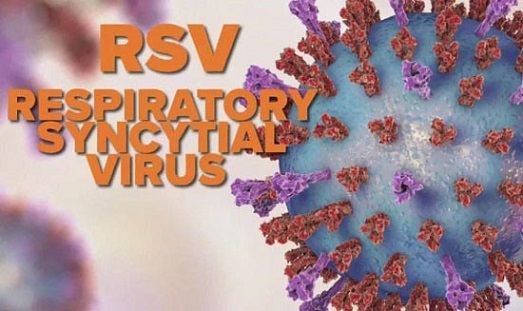JAK/STAT pathway identified as a therapeutic target in Respiratory Syncytial Virus (RSV) infections
Nikhil Prasad Fact checked by:Thailand Medical News Team Jul 19, 2024 9 months, 3 weeks, 3 hours, 4 minutes ago
Medical News: In an exciting development, scientists have uncovered how the respiratory syncytial virus (RSV) sabotages our immune response, revealing a promising new target for drug developers. This discovery is crucial as RSV is a major health threat, causing approximately 33.1 million cases globally each year. It is the leading cause of bronchiolitis and viral pneumonia in infants and poses significant risks to children and the elderly.
How RSV Evades the Immune System
Researchers from Trinity College Dublin, Dublin City University, Children's Hospital Ireland at Tallaght, and Coombe Women’s and Infants University Hospital-Ireland collaborated on this groundbreaking study. Working with human airway epithelial cells, the team discovered that RSV suppresses a critical biological pathway in our cells known as the JAK/STAT pathway. This
Medical News report explains how the virus prevents key "immune system igniters" from entering the cell nuclei. These igniters are usually activated by interferon-alpha, a natural antiviral produced by our bodies.
 JAK/STAT pathway identified as a therapeutic target in Respiratory Syncytial Virus (RSV) infections
JAK/STAT pathway identified as a therapeutic target in Respiratory Syncytial Virus (RSV) infections
According to Dr Nigel Stevenson, assistant professor of virology and immunology at Trinity's School of Biochemistry and Immunology, interferon-alpha activates signals in our cells via the JAK/STAT pathway. This activation triggers hundreds of antiviral genes that target the virus in multiple ways. However, RSV halts this process, effectively stalling our immune response and allowing the virus to take hold rapidly, leading to serious health issues.
A New Hope for Treatment
Dr Stevenson, based at the Trinity Biomedical Sciences Institute (TBSI), emphasized the significance of this discovery. "Our findings are exciting because they identify the JAK/STAT pathway as a prime target for therapeutic immune restoration," he explained. Understanding how RSV evades our immune system is crucial for drug designers aiming to develop effective treatments.
The potential impact of this research is substantial. A therapeutic targeting the JAK/STAT pathway could significantly improve the treatment of RSV and even help clear infections. This would be a much-needed solution for vulnerable populations such as children and the elderly.
In-Depth Study Findings
The study delves deep into the mechanisms of RSV's immune evasion strategies. The researchers found that RSV-NS1, a non-structural protein of RSV, interferes with the JAK/STAT signaling pathway in epithelial cells. Specifically, RSV-NS1 enhances the phosphorylation of STAT1 but not STAT2. Interestingly, the total protein levels of STAT1 and STAT2 were unaffected by RSV-NS1.
Further investigations revealed that RSV-NS1 binds to STAT1, reducing its interaction with the nuclear transport adapter protein, KPNA1. This binding disruption hinders the nuclear translocation of STAT1, which is crucial for activating a
ntiviral genes. The study suggests that this interference might be a key mechanism by which RSV suppresses the immune response.
The JAK/STAT pathway is a primary defense mechanism against viral infections. When interferon-alpha binds to its receptor on the cell surface, it triggers a series of phosphorylation events that activate STAT proteins. These activated STAT proteins then form dimers and translocate to the nucleus, where they initiate the expression of antiviral genes.
RSV-NS1 disrupts this process by binding to STAT1 and preventing its association with KPNA1, a protein that facilitates the transport of STAT1 into the nucleus. Without proper nuclear translocation, STAT1 cannot activate antiviral genes, allowing RSV to evade the immune response and replicate more effectively.
Broader Implications for Viral Infections
This discovery not only enhances our understanding of RSV but also sheds light on general viral strategies for immune evasion. Many viruses have evolved mechanisms to inhibit the JAK/STAT pathway, ensuring their survival and replication. For instance, Hepatitis C virus and Human immunodeficiency virus target STAT proteins for degradation. Similarly, the Ebola virus VP24 protein and SARS-CoV-2 ORF6 inhibit STAT1 nuclear translocation by interacting with nuclear transport proteins.
Understanding these viral strategies is essential for developing broad-spectrum antiviral therapies. By targeting common mechanisms like the JAK/STAT pathway, researchers can design drugs that are effective against multiple viruses.
Future Directions
The study provides a foundation for future research into therapeutic interventions targeting RSV-NS1. Identifying the exact amino acid interactions between RSV-NS1 and STAT1 could lead to the development of small molecules or peptides that disrupt this interaction. Such therapeutics could restore the normal immune response, helping to clear RSV infections.
Additionally, the research highlights the importance of investigating other viral proteins and their interactions with host immune pathways. By mapping out these interactions, scientists can develop a comprehensive understanding of viral immune evasion and design more effective treatments.
Conclusion
This breakthrough in RSV research offers new hope for treating a virus that poses significant health risks to infants, children, and the elderly. By identifying the JAK/STAT pathway as a critical target for therapeutic intervention, scientists have opened the door to developing more effective treatments for RSV.
The study findings were published in the peer-reviewed journal: Frontiers in Immunology.
https://www.frontiersin.org/journals/immunology/articles/10.3389/fimmu.2024.1395809/full
For the latest on RSV, keep on logging to Thailand
Medical News.
Read Also:
https://www.thailandmedical.news/news/medical-news-respiratory-syncytial-virus-rsv-infects-nerve-cells-directly-and-can-cause-a-variety-of-long-term-neurological-issues
https://www.thailandmedical.news/news/rsv-news-what-they-are-not-telling-you-about-current-respiratory-surges-new-rsv-genotypes-at-play-and-sars-cov-2-induced-immune-dysfunction
